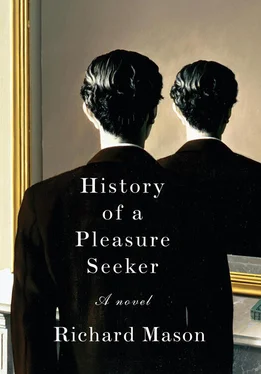Both young men were so absorbed in each other and themselves that neither noticed the regular presence of a worldly, well-built male passenger in his forties, with a neat beard and a hawk nose. Jay Gruneberger wondered whether the dark one was a poor sailor, because he never appeared at meals — but no, he was eating with great delight whenever he saw him. He could find no explanation for his regular absences. Nor for the blond and the dark always and only appearing together. He watched them and saw the look on the steward’s face when his friend spoke. More than once he was tempted to intrude on their conversations and introduce himself, but he was too well known and too happily married to initiate contact until he could be certain of their discretion.
On the ninth day of the voyage, Didier was on lifeguard duty at the first-class indoor swimming pool. He had put a pair of bathing trunks on a passenger’s bill and given them to Piet, who looked magnificent in them. The pool was one of the glories of the ship, decorated in the stylized motifs the first Napoleon made fashionable after his Egyptian campaign; as grand and shadowy as a Pharaoh’s tomb.
The sight of Piet Barol in bathing drawers heightened Didier’s sense of urgency. They had only eight more days in this world-no-world on the ocean; the approaching shore threatened everything. It was a calm day. Ropes and swings had been attached to the ceiling to be climbed up and dived from. Piet made rather a display of himself, climbing hand over hand halfway to the roof, the muscles in his back writhing like serpents; knotting the rope around his feet; diving down again.
His performance drew applause. He had a steam in the Turkish hammam and then a dip in the iced plunge pool. By the time he reentered the changing room, his body was red and tingling. He was aware of his skin, a pleasant tautness in his limbs, and then, abruptly, of having had no contact with another human being since his last delicious afternoon with Jacobina. He needed to piss and went to the urinal, wondering how he might get some of what he needed. He had just pulled his vest down to free himself when Didier entered the room.
Didier went to a locker and undressed quickly, knowing that if he were caught in the passenger changing room he would be dismissed. The impulse to be naked near his friend was imperative; it dimmed all risk. Piet glanced round and saw Didier facing away from him, changing from one bathing suit into another. He turned back to the wall, but at the reaches of his vision he was aware of the lightly muscled body he knew so well. It brought to mind their first conversation; the flicker of instinct that had told him Didier might be persuaded to ease certain intimate frustrations.
He had desisted on that occasion and not thought of it again. He had never combined such things with deep affection. For the first time he understood that it was possible to do so if one dared. Didier had stopped moving. Piet felt himself watched and looked down at his prick, now stiff and insistent in his hand. He was embarrassed but also afraid — because he did not want to have a love affair, and he understood that Didier would do nothing for him except out of love. Nevertheless he could not piss. He waited, trying to calm himself, and a door opened.
A well-built man with a neat beard and a hawk nose entered. At this intrusion Didier came to himself, collected his trunks, and went through the door into the stewards’ room. The bearded man went to a sink and washed his hands. When he had gone, Piet went into a lavatory stall and dealt with himself vigorously.
That night, Didier stood by a silver-gilt dessert trolley thinking of the afternoon. The room in which he was stationed was two decks high, a miniature theater in gold and turquoise and red velvet. Where the seats and boxes would have been on land were tables with shaded electric candlelights. An entire opera was staged on each voyage, generally on the second-last night at sea. On this journey the performance was scheduled for the following evening to avoid clashing with the Bal de la Gloire on St. Helena.
It was Didier’s responsibility to serve wafer-thin slices of cake without disturbing audience or performers. Tonight’s dancers were making so much noise this required no concentration. A middle-aged lady beckoned and he went to her, deep in thought. Passengers occupying suites were placed closest to the stage. The English couple staying in the Henri de Navarre did not care for music; their table was empty almost every night. If Piet came after dinner and it was empty again, he would be safe for the rest of the evening.
Didier conveyed his plan the next morning as he served his friend coffee in the veranda café. “Wear the tailcoat the Vermeulen-Sickertses gave you and your gold-and-onyx studs.”
“But what if they come to their table?”
“Dinner’s served before the music starts. If they’re not there for that, they won’t be coming at all. I’ll open the grille for you at ten.”
Percy Shabrill was in their cabin when Piet returned to it. “Nineteen orders so far and still five days to go. I must say, there’s a good crowd on this ship.” He was entering details into a ledger, self-consciously. Piet’s extended absences had begun to disconcert Percy, who suspected his cabinmate of having an entrée not available to him. It made him louder and more boastful, and his thundering conviction tugged on Piet’s spirits.
As Percy told him that he had already done enough business to pay for half his passage, Piet could only admit that he had employed his time much less profitably. It was amusing to sit all day in a sumptuous room, talking to a friend and eating and drinking more lavishly than he could ever afford to do again, but Percy’s vigor made him ashamed of retreating from his responsibilities.
“And what will you be doing in South Africa?”
It was the first personal question Percy had asked him, and Piet had no answer. “I’ll see what’s needed when I get there.”
“Confident devil. You mean to say you’ve no concrete plans? No connections?” Percy chuckled, secretly unnerved. “You’re a braver fool than I.” He went back to his ledger, but the word “fool” hung in the humid air of their cabin and seemed to Piet to be precisely what he was. He lay down on his bunk and pretended to read. Percy’s purposeful bustling depressed him further. He watched Percy dress in silence and said he was seasick and could not eat. The dinner bell rang. At last he was alone — but at Percy’s departure his inner furies turned on him and made the hot, expensive, rattling room a little hell.
At nine o’clock he took out the tailcoat he had worn to Constance Vermeulen-Sickerts’ birthday party and the box of studs Egbert had given him hours before the final catastrophe. He washed and put them on without joy. When he was dressed, the discrepancy between his inner and outer selves troubled him. Confronting him in the mirror was a young man in glorious good health, apparently favored by nature and fortune. His glowing face gave no hint of the self-disgust within; neither did his clothes suggest the alarming truth that he had no funds to keep them. They would have to be pawned as soon as he reached Cape Town.
He went to the reading room. It was empty; so was the service corridor behind it. As he went through the baize door into first class, he was struck by the total silence . The rattling of his cabin had seeped into his bones; its sudden lifting was a miracle. He was standing in a corridor hung in pale blue brocade embroidered with waves and shells. He went down the passage, his leather soles sliding over the thick carpets, and as he passed the reading room a steward emerged and bowed. “The singing’s just starting, sir, if you were hoping to catch it.” He opened the door into the staircase hall. “Lift or stairs?”
Читать дальше












